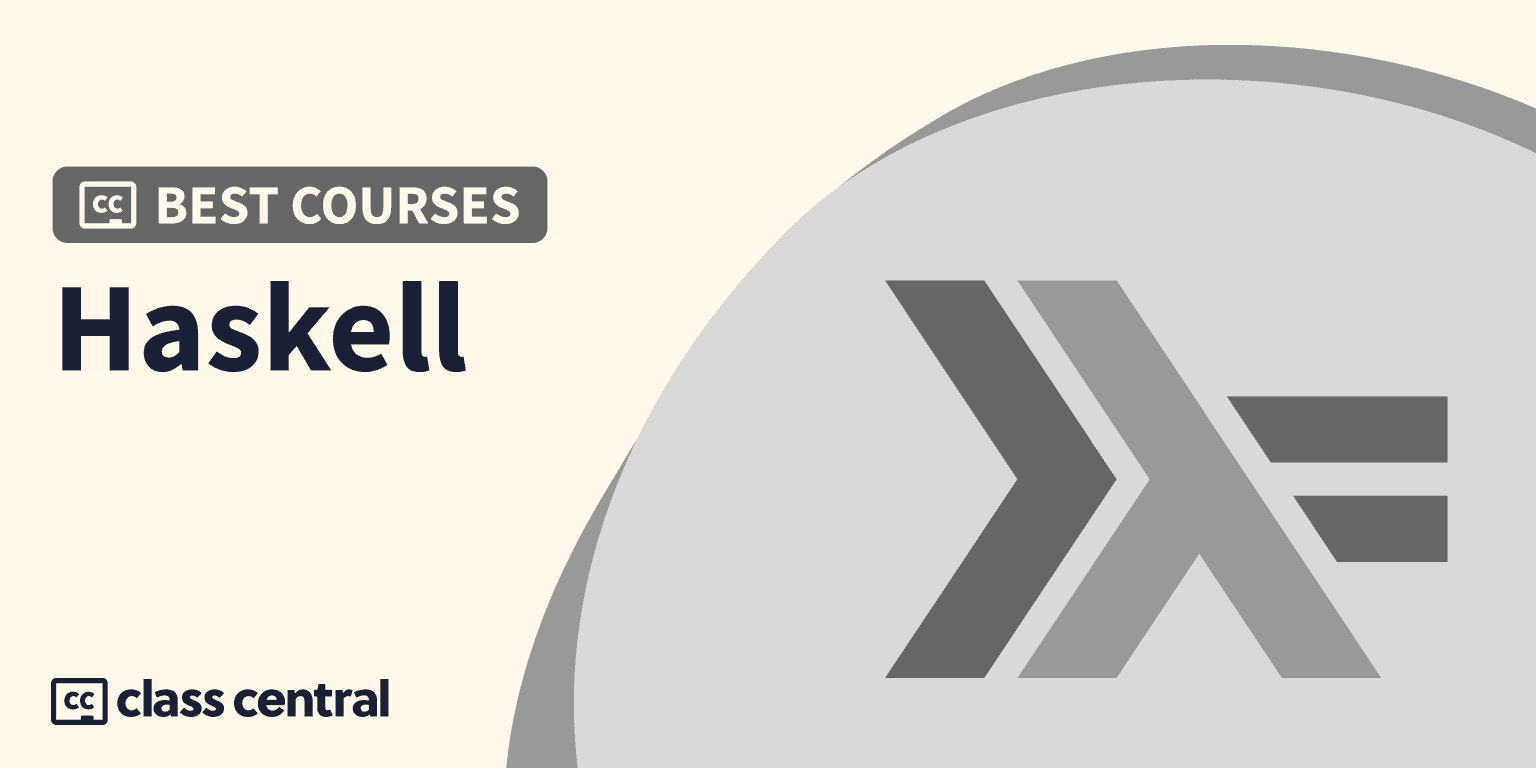7 Best Free Haskell Courses for 2025
Here is a guide with the best free online courses to learn Haskell for both beginners and experienced programmers.

Haskell is a purely functional programming language used commonly in academia and research. It is geared towards the functional programming paradigm, meaning that functions in Haskell resemble their mathematical counterparts more closely than other imperative programming languages. Along with other distinct features like laziness, algebraic data types, and monads, learning Haskell opens you up to a whole other way of coding.
In this Best Courses Guides (BCG), I’ve picked the best free online courses to learn Haskell from over 80 Haskell courses on Class Central. These courses are created by well-known institutions: University of Helsinki, Glasgow, Nottingham among others. We’ve also thrown in a couple of super offerings from YouTube and independent providers for good measure.
Click on the shortcuts for more details:
- Top Picks
- What is Haskell?
- Why You Should Trust Us
- Courses Overview
- How We Made Our Picks and Tested Them
Here are our top picks
Click to skip to the course details:
What is Haskell?
Haskell is a general-purpose, statically-typed, purely functional programming language used for teaching, research and industrial applications. Named after the logician Haskell Curry, it first appeared in 1990 as an open source alternative to other proprietary programming languages. It is one of the most popular functional programming languages, ranking 31st on the Tiobe Index.
Haskell is purely functional, which means that functions do not update or modify variables and state. This gives the programmer comfort as they’ll know that the code they write will not modify anything outside their body. It is also statically typed at compile time while at the same time having type inference, so you can ensure that no type errors occur during run time. And with other cool features like concurrency and laziness, Haskell has a lot of things going for it.
Why You Should Trust Us
Class Central, a Tripadvisor for online education, has helped 60 million learners find their next course. We’ve been combing through online education for more than a decade to aggregate a catalog of 200,000 online courses and 200,000 reviews written by our users. And we’re online learners ourselves: combined, the Class Central team has completed over 400 online courses, including online degrees.
Courses Overview
- All of the courses in this guide are free or free-to-audit
- Half of the courses are beginner-friendly (no programming experience required) while the other half are for intermediates (have some programming experience)
- Around 1.2K people are following Haskell Courses on Class Central.
Best In-Depth Haskell Course For Beginners (University of Helsinki)
Haskell MOOC is a free text-based online course on the Haskell programming language for beginners to programming. The course is split into two parts: Part 1 focuses on the basics of Haskell in the pure functional programming context and Part 2 will introduce Input/Output (I/O) and monads.
The course also has an active Telegram channel where you can ask for help if needed.
No prior knowledge of programming is required to take this course, although knowing a programming language is helpful.
What you’ll learn:
- Fundamentals of Haskell and functional programming
- Advanced concepts: recursion, higher-order functions, algebraic data types
- Key Haskell features: laziness, purity, I/O operations
- Complex topics: functors, applicatives, and monads.
The University of Helsinki has published many other free high-quality MOOCs like Elements of AI and Java Programming.
| Institution | University of Helsinki in collaboration with Nitor |
| Instructor | Antti Laaksonen, John Lång, and Joel Kaasinen |
| Level | Beginner |
| Workload | 100 hours |
| Exercises | Quizzes and programming exercises |
| Credits | 10 ECTS credits for Helsinki students |
| Certificate | None |
Best University-Level Course For Programmers (University of Nottingham)
Functional Programming in Haskell is an introductory course on Haskell by Professor Graham Hutton from the University of Nottingham.
In this free course, you’ll learn how to code in the functional style with Haskell. By the end of the course, you’ll have a strong grasp of both the Haskell programming languages and functional programming paradigm.
To take this course, you should have some experience with imperative programming (variables, control structures, and data structures).
What you’ll learn:
- Core principles of functional programming and Haskell syntax
- Advanced concepts: typeclasses, recursion, higher-order functions
- Practical applications: list comprehensions, I/O operations
- Haskell’s lazy evaluation behavior
- Transition from imperative to functional programming paradigms.
You can find the course web page at Functional Programming (nott.ac.uk). The next course you should take after this course is Advanced Functional Programming in Haskell, where it consolidates and solidifies your knowledge of functional programming.
| Provider | YouTube |
| Instructor | Graham Hutton |
| Textbook | Programming in Haskell – 2nd Edition |
| Level | Intermediate |
| Workload | 10 hours |
| Views | 194K |
| Exercises | Code demos |
| Certificate | None |
Best Intro to Haskell for Programmers (Dmitrii Kovanikov)
Haskell and Functional Programming course for complete beginners goes through the fundamentals of Functional Programming (FP), Haskell Syntax and teaches you skills for solving problems in the functional style. By the end of the free course, you’ll be able to write a simple program in Haskell that interacts with the real world (e.g. search a substring in a file, count the number of files with the specified extension, etc).
No prior knowledge of FP or Haskell is required to take this course.
What you’ll learn:
- Fundamentals of functional programming and Haskell syntax
- Key Haskell concepts: immutability, higher-order functions, lazy evaluation
- Advanced topics: algebraic data types, pattern matching, typeclasses
- Practical applications: file operations, string manipulation
- Monad programming patterns and applicatives.
| Provider | GitHub |
| Instructor | Dmitrii Kovanikov |
| Level | Beginner |
| Workload | 8 hours |
| Exercises | Practical exercises |
| Certificate | None |
Best Concise Course For Beginners (Type Classes)
If you have never programmed in your life, but are curious as to what Haskell and functional programming is all about, Type Classes’s Beginner crash course is for you!
This course is not everything-you-need-to-know about Haskell. Instead, it aims to get you with the basics and a little bit more to get you thinking in Haskell.
No prior experience with programming is required to take this course.
What you’ll learn:
- Haskell basics: functions, types, and GHCi usage
- Writing interactive programs in Haskell
- Fundamental concepts: polymorphism, recursion, higher-order functions
- Introduction to important typeclasses: Monoid, Functor, Monad
- Project organization and practical application of Haskell concepts.
After completing this course, you should take the Validation course, book, or Functortown to learn more about Functor and Monad.
| Website | typeclasses.com |
| Instructors | Chris Martin |
| Level | Beginner |
| Workload | 5–6 hours |
| Certificate | None |
Best Hands-On Course With Exercises (Tony Morris)
The aptly named Functional Programming Course will guide you through the basics of functional programming with Haskell.
The free interactive course is structured linearly to assist beginners to Haskell as you’ll learn mainly through reading the course materials and completing the hands-on course exercises.
You should have some programming experience prior to taking this course.
What you’ll learn:
- Haskell syntax and program structure
- Core functional programming concepts: functors, applicatives, monads
- IO operations in a pure functional language
- Advanced topics: states, comonads, parsers
- Practical problem-solving skills through diverse coding exercises.
| Provider | GitHub |
| Instructors | Tony Morris and Mark Hibberd |
| Level | Intermediate |
| Workload | N/A |
| Exercises | Practical exercises with answers |
| Certificate | None |
Best Project-Based Course With Code Feedback (Kowainik)
Learn4Haskell teaches you how to do functional programming in Haskell with just four pull requests.
To start the free interactive course, fork the project and begin reading and working through the materials and coding exercises. But why the hassle? Because once you’re done with the exercises, the instructors will check your code and provide you with valuable feedback (the best part about this course!).
By the end of the course, you should be able to independently create and read basic Haskell code, as well as understand monads and other famous concepts of functional programming.
The course is for people who don’t know Haskell but have some prior programming experience.
What you’ll learn:
- Haskell syntax and fundamental functional programming concepts
- Advanced topics: pattern matching, recursion, polymorphism
- Custom types and typeclasses in Haskell
- Key functional programming concepts: Functor, Applicative, and Monad
- Practical skills through coding exercises with instructor feedback.
| Institution | Kowainik |
| Provider | GitHub |
| Instructors | Veronika Romashkina and Dmitrii Kovanikov |
| Level | Intermediate |
| Workload | N/A |
| Exercises | Programming exercises with solution |
| Certificate | None |
Best Platform for Practicing Haskell Programming (Exercism)
So maybe you’ve taken a course on Haskell from this guide. Now what?
Well, Exercism will tell you what. Exercism is a free online coding platform that provides tons of coding exercises with instant automated feedback for you to practice and learn from.
Not only that, but Exercism also allows you to request personal mentoring for certain exercises for free. That way, an experienced Haskell programmer will look through your code and tell you how to improve on it.
Programmers of all levels of experience can join this platform, as exercises range from easy to challenging.
- Easy exercises include converting a long phrase into an acronym, randomly generating DnD characters, and translating RNA sequences into proteins.
- Medium difficulty exercises consists of computing Pascal’s triangle, implementing a clock that handles times without dates, and transposing text
- The most challenging exercises provided are using lenses to update nested records, resting a zipper for a binary tree, and making a chain of dominoes.
Each exercise comes with automatic analysis of your code as well as an opportunity to request personal mentoring to help you better understand your code’s strengths and flaws.
| Provider | Exercism |
| Level | All |
| Enrollments | 28K |
| Exercises | 100+ hands-on programming challenges |
| Mentors | 354 |
| Certificate | None |
How We Made Our Picks and Tested Them
I built this guide following the now tried-and-tested methodology used in previous Best Courses Guides (you can find them all here). It involves a three-step process:
- Research: I started by leveraging Class Central’s database with 200K online courses and 200K+ reviews. Then, I made a preliminary selection of Haskell courses by rating, reviews, and bookmarks.
- Evaluate: I read through reviews on Class Central, Reddit, and course providers to understand what other learners thought about each course and combined it with my own experience as a learner.
- Select: Well-made courses were picked if they presented valuable and engaging content and fit in a set of criteria: comprehensive curriculum, affordability, release date, ratings and enrollments.
Fabio revised the research and the latest version of this article.

Elham Nazif
















